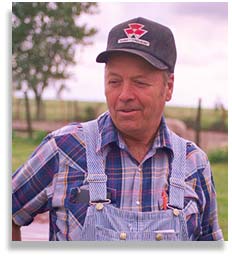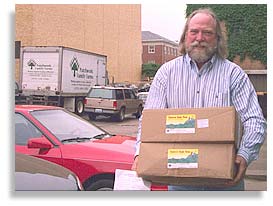|
Patchwork Family Farms finds new markets
Perry, along with other hog farmers around the state, foresaw the bleak future of the pork industry. Even in 1994, there were unmistakable signs for these farmers that concentration within agriculture was about to occur. Hog corporations were rapidly increasing in size, shouting the warning cry to farmers that times were about to change. Perry, being a member of the Missouri Rural Crisis Center, went to the non-profit organization for help. Other independent producers in north Missouri followed, and so began Patchwork Family Farms. Patchwork Family Farms has withstood the violent downturns in a volatile market were family farmers are struggling to compete. This project has proven to be a viable alternative that can give independent producers a guaranteed price that meets or exceeds cost of production while keeping consumers' prices competitive. Patchwork Family Farms is catching the attention of many hog producers around the state with its fair prices, sustainable growing practices and a sales volume that has more than tripled since December of 1998. Each year Patchwork has grown, having at least doubled the number of hogs slaughtered and the gross sales since 1994. The number of producers has also increased, Patchwork now has 12 independent family hog farmers participating in the project. Patchwork Family Farm's growth can be attributed to hard work and a belief that independent hog producers, with a little creativity, can step out of a system that is not working for them and see a great deal of success. This type of market, where a few firms control the entire system, leaves little room for the independent producer or fair prices. "When you have four to five food clusters controlling the majority of the global food system, there is little opportunity for family farmers," said Bill Heffernan, rural sociologist at University of Missouri-Columbia. "In the case of the hog industry in this country, six firms control 75 percent of the market." Patchwork has made great gains by creating its own market. Since February, Patchwork has acquired sales from ten new businesses in the Columbia area. They have seen a doubling in sales volume each year since 1994. In 1997, Patchwork earned $60,000 in gross sales. That figure jumped to $120,000 in 1998, and sales are expected to break a quarter of a million dollars this year. By cutting out the middleman, this project has kept more money in producers' pockets. Last year, Patchwork producers received $25,000 more than if they had sold their hogs on the open market. Producers saw these payments up front, not after the product was sold. Ovid Lyon, a Patchwork producer for three years, has seen the economic benefits of this type of system.
Patchwork producers receive no less than 43 cents per pound for their product or 15 percent above market price. During 1998, when hog prices hit record lows of 7 1/2 cents per pound, Patchwork producers were still receiving no less than 43 cents per pound while keeping their prices competitive in the grocery stores, restaurants and retail outlets. "What we want to do is produce and sell a premium quality product. This requires sweat equity and a passion for what you're doing," said Perry. "As producers, we work together on every step." Patchwork producers have been recognized by the USDA, EPA and Oxfam America for their efforts to help the environment and sustain the traditions of rural communities. Along with good stewardship of the land, Patchwork producers must adhere to the following sustainable and humane growing standards. Growth hormones or synthetic growth promoters are prohibited. Sources of feed and water must be antibiotic-free. Animals must be non-confinement, receiving adequate amounts of sunshine, fresh air and quality feed necessary to maintain good health. Processing of the Patchwork pork products is done at a federally inspected, family owned locker in Hale, Missouri. The final product is then sold to restaurants, grocery stores and other retail outlets by the marketing coordinator and Patchwork producers. The success of Patchwork is a testament to the fact that producers can cooperatively produce, process and sell their products in a way that will support independent producers, create jobs for rural community members and offer a locally raised product to consumers. The vision of this project is to keep hog farmers on their farms, demonstrate the economic viability of independent hog producers and to provide an example of a project that can be replicated. Perry knows that Patchwork Family Farms has helped him stay in business. He takes pride in being a third-generation farmer. However, he knows that thatís not enough. "Patchwork is not just a solution to a system that does not care about farmers," said Perry. "It can be used to demand policies that will benefit all independent family farmers and the future of agriculture." Visit the Patchwork Family Farms web site at http://www.patchworkfamilyfarms.org Also read:
|
||||
| Published in In Motion Magazine June 20, 1999. |
||||
If you have any thoughts on this or would like to contribute to an ongoing discussion in the  What is New? || Affirmative Action || Art Changes || Autonomy: Chiapas - California || Community Images || Education Rights || E-mail, Opinions and Discussion || En español || Essays from Ireland || Global Eyes || Healthcare || Human Rights/Civil Rights || Piri Thomas || Photo of the Week || QA: Interviews || Region || Rural America || Search || Donate || To be notified of new articles || Survey || In Motion Magazine's Store || In Motion Magazine Staff || In Unity Book of Photos || Links Around The World NPC Productions Copyright © 1995-2020 NPC Productions as a compilation. All Rights Reserved. |



